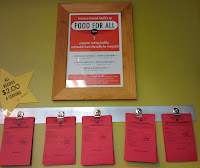Well, I was ready.
Jacqueline Hannah, general manager of Common Ground Food Co-Op in Urbana, appeared. She's the one in pink in the photo below.
I had just completed a week of voluntarily eating on $4.50 a day as part of Feeding Illinois' Snap Hunger Challenge for Hunger Action Month. It took a lot of pre-planning and mining of my friends' experiences with healthy eating to survive on such a small daily food budget. I was hungry and pre-occupied with food the entire week. And I ate as healthfully as I could.
Some of my most valuable resources were recipes from the Co-Op's Food for All program. These recipes, created by Jacqueline and freely available as red recipes sheets for the taking, show you how to feed yourself and your family an all-organic meal for less than $2 per serving. Some of the recipes include meat and you can add meat to most of them but that will increase the price per serving.
To deepen my knowledge about how to spend less on food, eat healthier and more organically, I attended a free class Saturday afternoon offered by the Co-Op called "Eating Healthy on a Budget." The class happens every month and is taught by Jacqueline. (For this and other offerings at the Co-Op, visit their classes and events page on their website.)
The class included myself and seven others: four students, a mother of two young children, and two people in their 50s. During our two-hour class we were given all of the Food for All recipes, hand-outs on grains and beans and breads and lots of tips.
The big theme for the class was: buy in bulk, cook in bulk and freeze in bulk and you will save lots of time and money and will eat better, healthier food. I learned this a long time ago and somehow I had gotten out of practice. The class inspired me enough to act on what I had re-learned.
I bought a bunch of organic bulk grains and beans. I saved a ton of money. The key is to avoid food that is processed, not just frozen dinners, but canned and boxed anything. You will pay 2-4 times more to buy organic canned beans than you will to buy organic dry beans and cook them yourself.
Armed with knowledge from my Eating Healthy on a Budget class, I pre-soaked my beans in a big bowl of water overnight. Jacqueline told us that pre-soaking the beans releases nutrients and breaks down enzymes for easy digestion. If you want to save time and avoid the pre-soak, you can add a clove of garlic or kombu seaweed to each cup of dry beans and you will achieve the same result. Pretty cool!
After the beans have soaked, you can cook them in a pressure cooker, a crock pot or in a pot on the stove. I tried the pressure cooker and stop pot methods. Of course, the actual cooking time in the pressure cooker was a lot less than on the stove top, but it took a lot of time for the cold water in the pressure cooker to get hot and up to 15 lbs. of pressure. And, I found that I had a harder time controlling the texture of the cooked beans in the pressure cooker.
The kidney beans cooked in the pressure cooker were overcooked and mushy even though I cooked them per the instructions. Maybe that's because after they are done cooking, they sit in the hot water while the pressure in the cooker goes down. This has to happen before you can open the pressure cooker and get the beans out.

The navy beans I cooked on a pot on the stovetop (after soaking overnight) turned out perfectly! They look just like they do when I buy them in a can in the store.
I didn't mind figuring out what worked best for me. I'll eat both batches of beans.
In all, my Sunday cook-fest yielded 12 cups of kidney beans, 11 cups of navy beans and 11 cups of pinto beans. After cooking, I drained the beans, cooled them and put them in 1 1/2-cup portions in ziplock bags and froze them.
I saved a lot of money, too! For example, the 2.14 lbs. of organic dried kidney beans cost me $6.23 and made the equivalent of 8, 15oz.-cans of organic kidney beans. Those canned beans would have cost me $15.12.
My grandmothers, both of whom canned and froze and cooked from scratch, would have been proud. And so would my mother, who taught me to can and freeze when I was in junior high school.
And, thanks to the sharing, caring and innovation of the people in this community, I was given the tools that inspired me to pick-up where my mom and grandmoms left off.
I am grateful!
Kimberlie Kranich, author of this post, is director of community engagement at Illinois Public Media (WILL radio.tv.online) and may be reached here.






